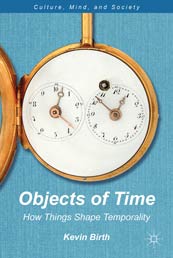
A written calendar, then, is not so much as a cognitive tool to assist the reckoning of time, but a cognitive and cultural tool that can either promote social coordination or intersubjective senses of uncanniness, or even both, as in the case of the Jewish calendar. Calendars as artifacts are tools of power and social coordination. There also is an important contrast between complex calendars that require trained experts to interpret them versus simple calendars that almost anyone can use. The former are associated with astrologers. In Hinduism, the ability to chart the multiple cycles in the sky is important and involves trained specialists. In contrast, the Gregorian calendar requires very little specialized knowledge to use. . . . The manner in which the Gregorian calendar mediates the different logics of Hinduism, Islam, and Judaism is to represent holidays in those faiths as moving — a cognitively useful, even if not entirely fair or accurate, representation. Objects of time think for their users, but the manner in which the Gregorian calendar thinks for non-Christians is not always useful to those non-Christians. What is useful in one respect is not functional in another. — pp. 96 – 98.
How do you interact with the Gregorian calendar?
- If you come from a culture dominated by the Gregorian calendar, do you have any interest in the origins of and idiosyncrasies of the Gregorian calendar? If so, what are you able to share when asked?
- Have you experienced “calendrical uncanniness” which has caused you to stop and take notice, e.g., the overlap of religious celebrations across cultural calendars? If so . . .
- What was the uncanniness?
- How did you respond?
- How, upon further reflection, do you interpret the uncanniness?
- Note: If you are from a Gregorian calendar culture and have no such experiences, I encourage you to keep your eyes open and meet more of your neighbors. Yes, a lot easier at a research university, graduate school, and/or major urban center. But one can also travel 🙂
- Are you sold on the Gregorian calendar over other possible forms (possibly the use of several forms at one time)?
- Anyone from a cultures in which the Gregorian calendar is not dominant, possibly using multiple calendars in some manner, have comments to make?
- Note: In case you have not done such already, I encourage you to
- visit earlier posts in series: What, then, is time? and How would you describe your “time consciousness?”
Updated: 4/26/2013, 10:20 am.
Tom enjoys daily conversations regarding living out the Biblical Story with his wife Theresa and their four girls, around the block, at Elizabethtown Brethren in Christ Church (where he teaches adult electives and co-leads a small group), among healthcare professionals as the Northeast Regional Director for the Christian Medical & Dental Associations (CMDA), and in higher ed as a volunteer with the Emerging Scholars Network (ESN). For a number of years, the Christian Medical Society / CMDA at Penn State College of Medicine was the hub of his ministry with CMDA. Note: Tom served with InterVarsity Christian Fellowship / USA for 20+ years, including 6+ years as the Associate Director of ESN. He has written for the ESN blog from its launch in August 2008. He has studied Biology (B.S.), Higher Education (M.A.), Spiritual Direction (Certificate), Spiritual Formation (M.A.R.), Ministry to Emerging Generations (D.Min.). To God be the glory!

Leave a Reply